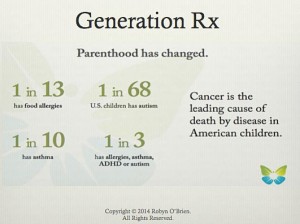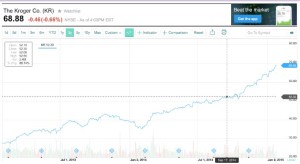Dump the Junk: Is the Grocery Manufacturers Association a 20th Century Relic?

In the last few weeks, a growing number of companies in the Grocery Manufacturers Association have announced that they are dumping artificial ingredients from their products. It is a growing trend in the face of consumer demand.
#dumpthejunk has become the rallying cry, as a growing number of consumers call on companies to remove artificial ingredients, as we find ourselves reading labels because of diabetes, food allergies, ADHD and so much more.
So why is this happening on a one-off basis? Why didn’t the Grocery Manufacturers Association give its members the heads up? Why are these companies slowly peeling off these ingredients one by one in a slow and often reactionary process? It’s death by a thousand cuts.
The Grocery Manufacturers Association is the voice of more than 300 leading food, beverage and consumer product companies, but will it be a relic of the 20th century?
A question that is starting to pop up is: Is the Grocery Manufacturers Association still delivering value to its members? Would members be better served by forming a new organization? What if a new group started? Let’s just hypothetically call it the Food Production Association, and its mission was to meet the needs of companies in the 21st century?
A look back at the history of the Grocery Manufacturers Association suggests this might be a good idea.
Founded in 1908, the Grocery Manufacturers Association is a self-described, active, vocal advocate for its member companies and a trusted source of information about the industry and the products consumers rely on.
But do 21st century consumers actually turn to this organization today or is it a relic of the 20th century? And is it an advocate for its members?
The organization’s website goes on to say:
“A vital role of GMA is to serve as a central resource for our members, providing industry model practices and a means for collaboration between members, retailers and service providers on important challenges and opportunities facing the industry.”
The organization may have done that twenty years ago, but is it still doing that today?
 The landscape of health has changed, and it is changing the landscape of food. Today, the rates of diabetes is skyrocketing, 1 in 4 children has a chronic condition, 1 in 13 children has a food allergy, 1 in 10 has asthma and 1 in 68 has autism, with cancer now the leading cause of death by disease in American children. The rates of these conditions are escalating, and parents are reading labels.
The landscape of health has changed, and it is changing the landscape of food. Today, the rates of diabetes is skyrocketing, 1 in 4 children has a chronic condition, 1 in 13 children has a food allergy, 1 in 10 has asthma and 1 in 68 has autism, with cancer now the leading cause of death by disease in American children. The rates of these conditions are escalating, and parents are reading labels.
Did any of us expect motherhood or fatherhood to look like this? Not at all. No one would choose autism, life threatening food allergies or cancer. No one. But we find ourselves face to face with these conditions every day. It is changing so many things in our lives, and it is changing how we approach the grocery store.
Some companies want to spend millions of dollars debating how we got here. Parents don’t have time. Their hands are tied managing these health conditions. CNN/TIME reported that the additional costs of raising a child with food allergies is $4,200/year. Consumers want transparency and denying them basic information about what is in the food we are feeding our loved ones is out of touch.
Over the last year, more than 60 state laws have been introduced to label genetically engineered ingredients in foods. Consumers know about it, companies know about it. Companies inside the Grocery Manufacturers Association are producing product lines without these ingredients, and those product lines are profitable pieces of their portfolio. One look at the success of Kroger’s Simple Truth, “free-from” line demonstrates what a brand can do when it removes additives, GMOs, high fructose corn syrup and more.
Consumers want “free-from” food. It’s not about debating the “how” or the “why” we got here. It’s about meeting her where she stands in the aisle of the grocery store, holding onto a child with diabetes or food allergies, or shopping for parent with cancer.

So if companies that are dumping the junk are being rewarded by both consumers and the stock market, shareholders and stakeholders, what purpose does the Grocery Manufacturers Association serve by getting in the way of that? Is that in the best interest of its members?
As the Association spends record amounts filing a lawsuit against the state of Vermont which has just taken a big step towards bringing transparency to its food system for its consumers, you have to wonder if this is money well spent for its members. What if instead, these members decided to leave the organization and start another one, one that truly met their needs in the face of changing consumer demand and the changing health of American consumers. Or what if some got aggressive and filed a “loss of business” lawsuit against it given the decline that companies like Kellogg’s are seeing in sales and the resulting employee layoffs as they entrench on the GMO labeling issue?
21st century families want free-from food. It isn’t complicated, and shareholders and stakeholders are rewarding the companies that understand that and are delivering products that meet that need.
They’re not debating the science, they’re not filing lawsuits, they are simply meeting us where we stand: in the aisles of the grocery store shopping for the 1 in 3 American children that now has allergies, asthma, ADHD or autism. They are building a new food economy, becoming icons for the 21st century consumer, making the Grocery Manufacturers Association look like a relic of the 20th century.
The $2.1 trillion food, beverage and consumer packaged goods industry employs 14 million U.S. workers. As consumers opt out of food loaded with artificial ingredients, demand is growing. From 2013-2018, demand for organic is expected to grow 14%, but in the United States, less than 1% of farmland is under organic farm management which means that we have to turn to countries like China and Romania for non-GMO or organic food. We are literally outsourcing that entire economic opportunity. It is not in the interest of our food companies, our families or our farmers.
If the Grocery Manufacturers Association was true to its mission it would meet the 21st century consumer where she stands, and it would be addressing this supply chain issue for its members. But it’s not.
As it stands, it is quickly becoming a relic of the 20th century, opening the door for another industry organization to form.
Can you imagine if Kroger, Target, Chipotle and other food companies joined together to form the Food Production Association whose mission was to build out a clean and safe food system and to secure the supply chain for 21st century families? Instead of channeling member dollars into lawsuits, it could grow the base of US farmland under organic management, so that we don’t outsource this economic opportunity for our companies, farmers and country to our trading partners.
Cancer, autism, food allergies and other conditions we are seeing in the health of our loved ones are not “trends,” neither is the demand for transparency. American consumers have a right to know whether the EPA regulates their corn as a pesticide or not. Sixty percent of the world’s population has been given that right.






